Belding: Elect politicians for capabilities, not celebrity

The White House
November 2, 2010
By the time this column is printed, the election of 2010 will be over. The votes will be counted, the winners will be known, and most of us will settle in for a long post-election’s nap. I hope that you will have chosen leaders based on their accomplishments and capabilities rather than on their name recognition and celebrity.
Leaders are not men who are simply well-known. Anybody can achieve notoriety or celebrity simply by being a subject of gossip day in and day out. Mass knowledge of staged events for this purpose are easy enough to achieve. Fame now depends on saying the most outlandish, crazy things in front of a news camera. Fame depends on winning the race to the bottom of political discourse.
Instead, leaders and the men who should be leaders should be chosen with regard to their already-existing public accomplishments. Ideally, men would be awarded their Nobel Prizes based on what they have done, not on what they might be able to do because of their celebrity status and name recognition worldwide. If you didn’t, you should have voted for a candidate because he has consistently proven himself to be a man of calculation and has put himself to the public’s use.
And no, entertainment value does not count as a public use. Politicians are at the service of their constituents. They exist to solve problems the individual constituents could not solve on their own, problems in which all constituents have a stake. Any fame politicians receive is not the object of their office — it is a corollary of it.
Political office does not exist for the celebrity. Offices of public trust are not landmarks of our constitution so that men can put themselves on the news every night without having tried to fix at least one of the world’s problems. They are not to be given to the celebrity-seekers.
Yet, time and again, they are. Campaigning for office to expose an issue — even a single issue — is one thing. Campaigning for office to increase one’s own prestige is quite another.
I won’t bore you with an elaborate description of the history of the late Roman republic, but I will tell you this: In examining its history, one finds an astonishing number of individuals who gained office with only their own interests in mind.
Roman politicians ceased putting themselves at the state’s disposal. They tried and succeeded in shaping events around their own desires, not actual circumstances of action. If one then studies historians of the early empire, one finds that they decried such behavior. They called it, amount with other things — more licentious activity, corruption of morals.
Civil wars pervaded the Republic’s last century. And while they do not consistently feature in American history, every two years sees the potential of a regime change. When the regime does change, it is peaceful. But the clashes of arms that decide civil wars and the tallying up of votes in biennial elections rely on the same — the force of numbers.
Political involvement by ordinary people does not focus around battles of rhetoric and debate, even though such activities are the substance of politics. Because of that, our elected officials are chosen based on their skills at showmanship.
Gone are the days, even in our age and in our country, where we ask not what our country can do for us, but ask what we can do for our country. Civic pride is difficult to come by where mass media shine cameras, lights, tape recorders and steno pads in the faces of people who might be of public interest. Instead of actually working to solve issues that in fact harm millions of people, politicians and the wealthy — those best-placed to practice philanthropy — concern themselves with achieving only the highest ratings.
Napoleon Bonaparte said, “Glory is fleeting, but obscurity is forever.” Instead of running the rat-race that is photographic glamour, politicians should work on creating enduring additions to the organic, living mass that is the community.
I think that at the end of their lives, the politicians who participated in the popularity contest will realize that, per Shakespeare, “All the world’s a stage, And all the men and women merely players: They have their exits and their entrances; And one man in his time plays many parts.”
I considered my votes on Tuesday. And if I knew that a candidate was a member of the community, or if he had proven himself a problem-solver, I voted for him. If I knew nothing about him, save his efforts to win, I refused to vote for him.






